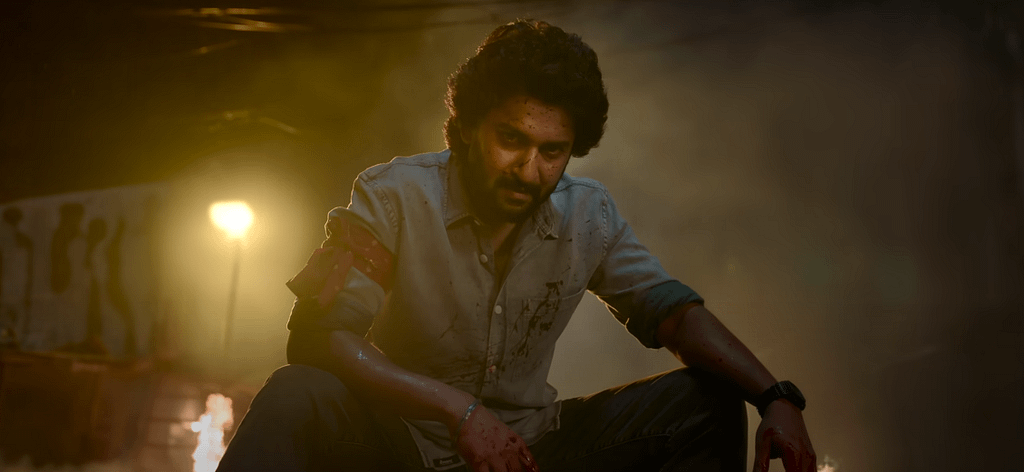The story of Devara unravels at a point in time when fear was an unsaid virtue, but the oozing freshness of courage was felt everywhere. It is a narrative study of the nature of human bravery against the turbulent journey of trials, tribulations, and pursuit of identity. In this blog, we go deep into the intricacies of the characters, the pivotal themes, and the overall message of courage that reverberates throughout the tale of Devara.

The Nature of Courage
Courage is mostly the ability of a person to do things where there is a presence of fear, pain, danger, and uncertainty. In Devara, courage is not a trait; it is an essence drawing characters to face their fears. It’s about the people who have caught fear in their eyes for the first time, portraying the utter contrast between their previous life and the challenges they had to face.
This juncture-from no fear to fear-is quite pivotal in the story. Characters are brought to a point beyond their vulnerable selves to an understanding of their identities. The plot suggests that true bravery is not experienced by one’s lack of fear but by one’s will to face his or her fears head-on.

The Role of Identity
Identity features a great deal in Devara’s story. The characters struggle with their identity amidst the tussle and demands that come from the outside world. In other words, the question of who they are gets interrelated to what they should perform or decide on. A serious thought which the story poses for its readers is upon the futility of identity and how it binds our decisions.
As the story unfolds, we are told that the protagonists are not defined by their backgrounds or affiliations but, in fact, by their choices and the courage they manage to summon from within during their adversities. The thematic strand pulls deep, reminding us that our identity evolves according to experiences and challenges that shape us.

The Bloody Path of the Red Sea
Devara is inextricably linked with the Red Sea, which has become the metaphor of bloodbaths and sacrifice in the name of bravery. “The story of the Red Sea written with blood” does say something about the far-reaching tragedy of the struggle in which these characters are involved-that is, trials they will have to face and the sacrifices which they shall have to do to achieve the goals.
The Red Sea is seen throughout the story, symbolizing crude realism and how life’s decision works. It borders on importance on the knowledge of the aftermath of a person’s actions and the way this affects humanity. Benefits of the Pursuit of Power and Dominance

In the world of Devara, power struggle drives the arcs of the characters. The struggle of control over the “mountain” symbolizes the greater conflict of good versus evil. The phrase “as long as you exist, this mountain shall obey only your orders, Devara” puts into perspective how much the protagonist struggles for dominance and is burdened with troubles because of it.
Moral dilemmas will of necessity be introduced in the quest for power, pitting characters against their values and beliefs. The line separating the good use of power from tyranny, as brought out in the story, is tenuous. A consideration which will strike a chord in readers over the nature of power and what it threatens to do to society. Complexity of Relationships

The relations between characters in Devara are complex and multi-layered. The interactions show the complexity of human emotions, loyalty, and betrayal. Very often, one’s desires conflict with his responsibilities, leading to conflicts which move the story along.
The lines “he only got his dad’s looks, not his courage” highlight the expectations held on them due to lineage. Indeed, the same is reflected when one finds pressure at home, around their family, to fulfill a certain agenda while striving to break free into self-identity. Their relations become reflections of their internal struggles; consequently, the whole story becomes so relatable and touching.

The Invisible Fear
The most engaging feature of Devara relates to “invisible fear.” When the protagonist says, “I choose to be an invisible fear from today,” this work shows how fear can motivate and hinder a person. The storyline will be developed upon such duality: how fears are overcome and how they lead or hinder the protagonists in their actions.
Invisible fear reminds one that even the tough ones sometimes are dogged by a moment of doubt and insecurity. It underscores the implication brought out by the acceptance of fear, rather than its suppression, to allow growth and development in the journey of the characters.

Conclusion: A Journey of Self-Discovery
Eventually, the story of Devara is one about self-discovery, bravery, and the most peculiar complication called a human relationship. By facing their fears and confusion about identity, challenging the power of control, the characters expose profound truths about themselves and their world.
This story calls upon one to reflect upon personal instances of courage, identity, and struggles that shape one’s life. Through Devara’s story, it poignantly reminds us that true courage is not in not feeling fear but in a firm desire to face it, learn from it, and emerge more wholesome on the other side.


